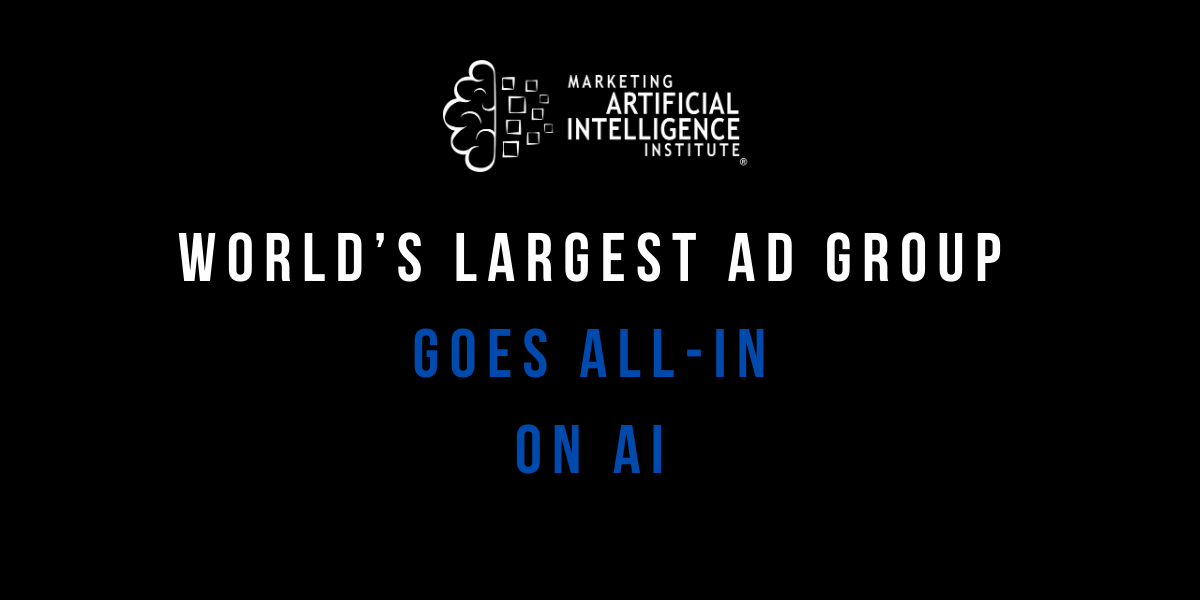We just got some big AI news in the agency world...
The world's largest ad group is spending $326 million on AI in the next 3 years.
Publicis Groupe is building "the industry's first AI-powered intelligent system."
The group went into detail in an extensive unveiling video. But here are the highlights:
The system is called Core AI. And it's a central AI system that will be accessible by all 100,000+ of the group's employees.
“We are bringing together all the data of the group, all the knowledge of the group,” the company's CEO told ADWEEK.
The publication says CoreAI is being built and trained in-house by a whopping 45,000 engineers and data scientists. And it's trained on the firm's trillions of data points, billions of personal profiles and daily bid impressions, and millions of creative assets.
The vision?
Have each employee plug into this centralized intelligence anytime they serve clients, in order to instantly converse with the company's decades-worth of proprietary data, knowledge, and expertise.
In other words, they're basically building an ultra-intelligent machine brain that sits at the center of the company and augments each human employee.
What does this mean for the agency world?
On Episode 81 of The Marketing AI Show, I got the answer from Marketing AI Institute founder/CEO Paul Roetzer.
Here's what you need to know…
This Is a Remarkable Vision for the Agency World
“What they presented is a pretty remarkable vision,” says Roetzer.
Though, he reminds us, it is not reality at the moment. But Publicis should be applauded for laying out such a clear picture of the company’s future in the age of AI.
It Finally Brings to Life the Idea of a Marketing Intelligence Engine
Publicis' CEO talked about CoreAI as a sort of intelligence engine for marketing—an idea that Roetzer has been theorizing for a decade.
“This is the closest vision I've heard yet to the thing that started Marketing AI Institute," he says.
The company began because Roetzer theorized it was possible to build an intelligence engine for marketing powered by AI. The need for such an engine grew out of his work building marketing strategies for clients at the marketing agency he used to own.
“At the agency, clients would come to us and they would want to grow their audience or generate more leads or whatever their goal was,” he says. “And then we would try to build strategies and allocate budgets to do it.”
But creating effective marketing strategies wasn’t always as scientific, repeatable, or effective as Roetzer hoped.
“I became convinced that the human mind was actually incapable of doing this in an optimal way,” he says. There are thousands of possible ways to spend a marketing budget to achieve certain goals. How are humans supposed to know which ones will work?
Back in 2011, Roetzer saw promising advancements in AI that led him to believe the technology could eventually solve for this strategic need in marketing—given the strides it was making in areas like finance with AI-powered high-frequency trading.
Roetzer believed it was only a matter of time before this technology came to the world of marketing. By 2014, he had developed the idea of an intelligence engine for marketing, which first appeared in his second book, The Marketing Performance Blueprint.
In the book, the intelligence engine was described as follows:
“Marketing automation platforms save time, improve efficiency, increase productivity, and help manage big data. They give companies unprecedented abilities to understand buyers, identify opportunities, track campaign performance, and link marketing activities to business outcomes.
But they do not provide insight into the billions of bits of data being created as consumers move from screen to screen and interact online and offline with brands.
According to IBM, 90 percent of all data in the world is less than two years old. Humans are not programmed to keep up, and yet turning data into intelligence and intelligence into strategy, and strategy into action, remains largely human powered.
What inevitably comes next are marketing intelligence engines that process data and recommend actions to improve performance based on probabilities of success. Think about it. Are we really that far off from an automated marketing strategy in which the marketer's primary role is to curate and enhance algorithm based recommendations rather than devise them?”
Roetzer admits we were a little further off than anticipated.
“10 years later, here we are. We're finally building the intelligence engine, at least within advertising,” says Roetzer.
Every CEO and Leader Needs to Pay Attention
Roetzer says this is one of the best visions he’s heard for what companies can become in the age of AI. (This is a concept we call building an “AI emergent” business.)
“This is what a CEO should be doing right now. This is the kind of thing you should be expecting in 2024 from the CEO of a company to lay out a clear vision with their leaders for what they can become with AI."
Mike Kaput
As Chief Content Officer, Mike Kaput uses content marketing, marketing strategy, and marketing technology to grow and scale traffic, leads, and revenue for Marketing AI Institute. Mike is the co-author of Marketing Artificial Intelligence: AI, Marketing and the Future of Business (Matt Holt Books, 2022). See Mike's full bio.



